Autores/as
Resumen
En este artículo repaso las ideas de Leibniz en apoyo de una concepción relacionista del espacio y las contrasto con los argumentos de los newtonianos a favor de la concepción substancialista. Examino la famosa correspondencia Leibniz-Clarke y discuto el rol de los principios metafísicos leibnizianos (el principio de Razón Suficiente, según el cual nada ocurre en el
universo sin una razón por la que deba ser así mejor que de otra manera, y el principio de Identidad de los Indiscernibles, o la posición de que no existe un par de objetos distintos
numéricamente que sean mutuamente indiscernibles). Intento arribar a una interpretación correcta de los problemas principales de que trata la polémica con el fin de obtener una respuesta para las dos preguntas siguientes: (1) si el Principio de Razón Suficiente implica el Principio de Identidad de los Indiscernibles, y (2) si durante el debate, Leibniz emplea el último principio en más de un sentido modal.

 PDF
PDF
 FLIP
FLIP





















